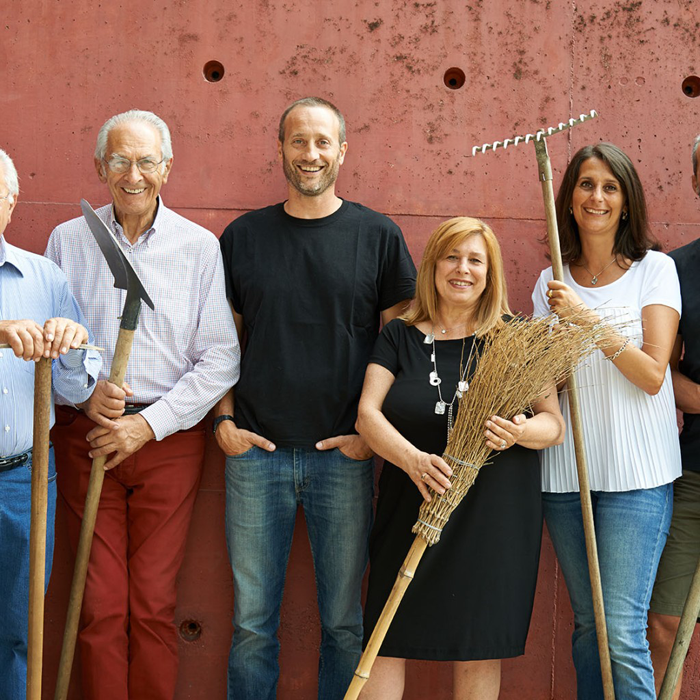
Pasini San Giovanni, Valtenesi & Lugana
Pasini San Giovanni was founded by Andrea Pasini in 1958 and is still run today by the family, now the third generation of winemakers. They’ve become a benchmark for the regions of Valtènesi and Lugana- both on the Brescia side of Lake Garda. Under the current guidance of cousins Paolo, Sara, and Luca, the their philosophy is focused on organic farming (fully certified as of 2016), biodiversity in the vineyards, indigenous varietals like Groppello and Turbiana, and a carbon neutral carbon footprint (their entire winery is run on solar). The winery itself is located in Valtènesi on the southeastern slopes of Lake Garda in Lombardy. Lake Garda, formed by glaciers at the end of the last Ice Age is Italy’s largest lake. Owing to its depth (over 1100 feet at its deepest) which acts as a natural heat reservoir, and the Alps to the north which protect from cold northern European winds, Garda has a uniquely warm climate for such a northern latitude. Olive trees, citrus, capers, and cactus are some of the more typically Mediterrean plants that thrive on the shores of the lake. The microclimate also permits grapes to thrive on all sides of the lake. In addition to Valtènesi on the southeastern side of Garda, Pasini San Giovanni also has vines in Lugana, located on the southernmost portion of the lake. The soils in Valtènesi are morainic in origin- the glaciers brought a mix of crushed rocks and pebbles of all sizes with them and deposited them on the slopes of the lake. In Lugana, a slightly flatter area, the soils have a higher percentage of clay. Additionally, both sides of the Lake produce Chiaretto- arguably Italy’s most historic and important rose. First created in 1896 by a Venetian with the help of French oenologists who recognized the warm climate as being ideal for rose, Chiaretto has been a rose only designation for more than a century. Initally founded by Andrea Pasini in 1958 as a winery, Pasini San Giovanni truly came into existence in 1977 when Andrea purchased 15 ha of vineyards and the San Giovanni farmhouse in Puegnago del Gardo. In the early 90s, Paolo and Luca Pasini, the third generation, assumed leadership and embarked on began to add vineyards in both Lugana and Valtenesi and built a new winery. In 2009 they made a major commitment to sustainability for future generations by beginning the organic conversion process and converting their winery to run entirely on solar power entirely on solar power. As of 2016 all their vineyards are certified organic. Their emphasis on biodiversity has led them to begin keeping bees to pollinate the vines, maintain cover crops, and plant flowers, and many native plants species throughout the vineyards. They focus on the native varietals of the Garda area- specifically Groppello for reds and Turbiana for whites. Groppello, an ancient grape that only grows locally, is a descendent of Sangiovese but bears little resemblance to it. Stylistically, it bears far more resemblance to grapes such as Frappatto, Poulsard, or Trepat: thin-skinned and relatively low in color and tannins. Groppello tends to producer fresh and lively wines with lower alcohols that can age 10-15 years. Turbiana, the grape of Lugana, is related to Verdicchio but has adapted to be ideally suited to the clay soils of Lugana. In the cellar, the attention to detail is unsurpassed. For their Chiaretto rose, a blend of Groppello, Marzemino, Barbera, and Sangiovese, four separate passes are made at optimal ripeness for each grape vs. picking them all at once. Each grape is then given its own ideal length of maceration before pressing; Groppello receives nearly 24 hours on the skins while Marzemino, thick-skinned and dark in color, is pressed immediately. All four grapes are then fermented separately before a final blend is assembled. Their preference across the range of wines favors transparency and freshness over power and density. They eschew the use of new wood altogether and don’t use any wood on the majority of their reds.
“Good wine comes from good soil. When we inherit good soil, it is our duty to preserve it - and even improve it - for those who come after us.” – Paolo Pasini
“Good wine comes from good soil. When we inherit good soil, it is our duty to preserve it - and even improve it - for those who come after us.” – Paolo Pasini

